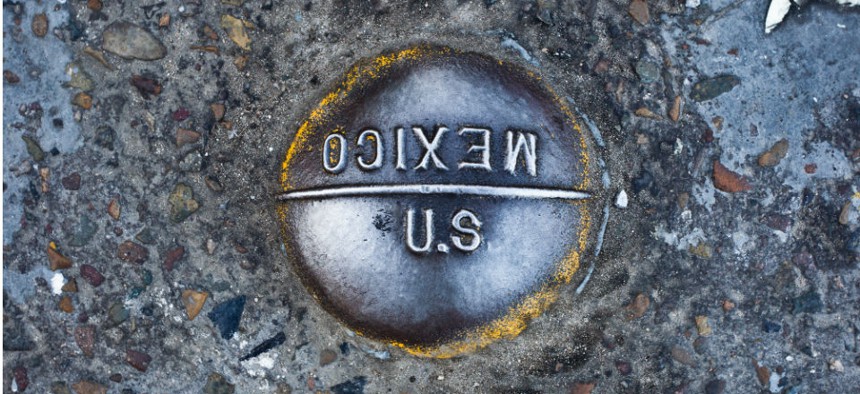
A marker on the Southwest border in San Ysidro, Calif. Josh Denmark/Customs and Border Protection
Senate Border Funding Bill Goes Down
Chamber heads home for recess unable to agree on an immigration measure.
The Senate failed Thursday to write the White House a $3.57 billion check to address the crisis at the border, Western wildfires, and Israel's missile defense system.
The bill went down on a 50-44 procedural vote that required 60 votes to carry. The failure and the Senate's impending departure for August recess, which leaves no time for Congress to resolve legislative differences, make it appear certain that President Obama will not see a dime of the supplemental funding for what both sides agree is a crisis of significant proportions.
Democrats cast the bill's failure as an urgent mistake, and they predicted that without the supplemental funding the administration would have to move money from other government accounts to cover the cost of managing the border crisis.
"We could have an Ebola crisis … and we're fooling around cutting [Health and Human Services]," said Appropriations Committee Chairwoman Barbara Mikulski of Maryland. "Failing to act is irresponsible."
The bill went down for a number of reasons, including Republican frustration that Majority Leader Harry Reid blocked amendments, but also because the GOP wanted to see significant policy changes in the law, including rolling back the president's 2012 order to defer legal action against immigrant children, known as Deferred Action for Childhood Arrivals.
"Their bill does nothing, zero, to solve the underlying crisis," Republican Sen. Ted Cruz of Texas said before the vote.
Democrats stood adamantly opposed to adding any policy changes, and Reid lost only two Democrats, Mary Landrieu of Louisiana and Joe Manchin of West Virginia, who defected to vote with the GOP. Behind closed doors, many Democrats viscerally opposed making policy changes, according to Senate Democratic aides, but most Democrats refrained from taking to the floor to voice their support.
"Well that's gonna be hard to come by at this late day, and because it's a life-and-death situation, I hope that we can deal with it in that context," Assistant Majority Leader Dick Durbin said before the vote. "The sooner we can get a clean supplemental passed the more likely it is that it'll help."
While Democratic leaders failed to deliver President Obama's funding request, they succeeded in keeping most of their caucus united, which contrasted sharply with the Republican House, which scuttled a planned vote Thursday afternoon.
The drama in the Senate took the form of Sen. John McCain of Arizona booming against Reid's amendment prohibition in an off-the-cuff speech shortly before the Senate voted.
"Now we have a humanitarian crisis on our border, a humanitarian crisis of incredible proportion, where thousands of young people while they're being transported by the coyotes, young women are being raped, they're falling off trains, terrible things are happening. And what are we presented here in the the United States Senate?" McCain said. "I say shame on you. I say shame on you for not allowing those of us who represent the states that are most affected by this to have an amendment, an amendment voted on. That is unbelievable to me."
By keeping Republicans from offering amendments, Reid saves members of his caucus from taking potentially risky political votes. At the same time he alienates Republicans and invites their fury.
Meanwhile, in the House the GOP headed into a closed-door conference meeting Thursday afternoon to hash out changes to an emergency supplemental and will reconvene for another private meeting Friday morning.
A vote will likely be held Friday, but it's one that holds no real weight as the Senate headed home for the August recess Thursday night.
Profound differences separate the chambers' emergency supplemental packages. The House bill merges policy changes with funding, while the Senate's sticks to providing money Obama requested to help curb the crisis.
The Democratic bill amounts to a $1 billion cut to the president's $3.7 billion request for the border crisis, in which some 60,000 children have streamed across the U.S. border from Central America.
The measure also provided $615 million for wildfires in the West as well as $225 million for the Israeli missile defense system known as Iron Dome.
"The issues that I'm advocating are deeply personal to me and I believe deeply personal to other senators," Mikulski said.
The action came on the Senate's last day before a five-week recess and ahead of a shortened work period before the election that saw senators eager to get back home.
When asked whether there were discussions underway to reach a compromise that could pass Congress, Republican Sen. Orrin Hatch of Utah paused for a moment.
"The plan is to just get out of here," he said before the vote. "People just want to get it wrapped up and just get back home."






